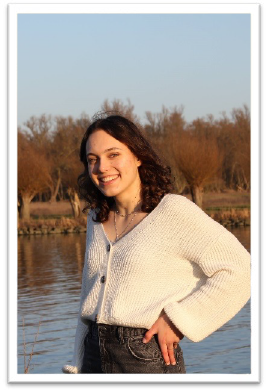One Health PACT / Avans – Lab-student: Danique Lichtenberg

Sixteen 3rd year Biology and Laboratorial Research students are working on OHPACT-related projects within Avans under the supervision of teachers with OHPACT as their client. Within this part of the curriculum of the bachelor education, project based learning is essential. Together with University Utrecht (Judith van den Brand, Giuseppe Giglia, Gianfilippo Agliani) students are unravelling the role of apoptosis in Usutu virus positive blackbirds. In addition, within the collaboration with Erasmus MC (Bas Oudemunnink, Emmanuelle Munger, Reina Sikkema), students are contributing to the development of a fieldable assay for the detection of vector-borne viruses from wildlife and clinical samples and optimizing the CO1 PCR for ticks species identification. In association with the LUMC (Louie Krol), students are investigating if the Culex pipiens-complex DNA can be detected in the guts of known mosquito predators using qPCR.
Who are these students? In the upcoming weeks we will share with you who are these students and on which topics they will focus.

Who am I?
My name is Danique Lichtenberg, and I am 19 years old. I am currently in my third year of the Bachelor’s study Biomedical Laboratory Research at Avans Hogeschool in Breda, the Netherlands. I am now working on a project in the specialization “Patient-oriented research”, in which I collaborate with One Health Pact.
What subject will I be focussing on this semester? What will I be researching?
The project I am working on together with Rik Hartog, in association with the Leiden University Medical Center (Louie Krol), is about different mosquito species in the Nieuwkoopse Plassen in the Netherlands. The goal is to detect the species “Culex pipiens” using qPCR with specific Culex pipiens primers. In addition, we will use the end-point PCR with universal mosquito primers and the Oxford nanopore sequence technique to investigate which species, besides Culex pipiens, are present in the Nieuwkoopse Plassen.
What would I like to learn?
Because of climate change, international travel, the dense population in the Netherlands and the many water ecosystems, it is easier for mosquitoes to live here and infect people, causing outbreaks. Mosquito-borne diseases like usutu, zika and west-nile can significantly impact humans. Therefore it is crucial to keep an eye on these species to control outbreaks. I would like to analyze these mosquito species to collect data for One Health Pact. I want to gain more knowledge about the impact of the changing factors on mosquito species.
What do I want to do with this in the future?
Next semester I will follow the pre-master Medical Biology at Radboud University. I am not sure which specific direction I want to go to yet, but my interest lies in public health. This project will contribute to my knowledge about mosquito habitats and outbreaks and give me more experience with different lab techniques.
You can find me on LinkedIn: https://www.linkedin.com/in/danique-lichtenberg-420b5b207/
I will now pass the baton to Rik Hartog.